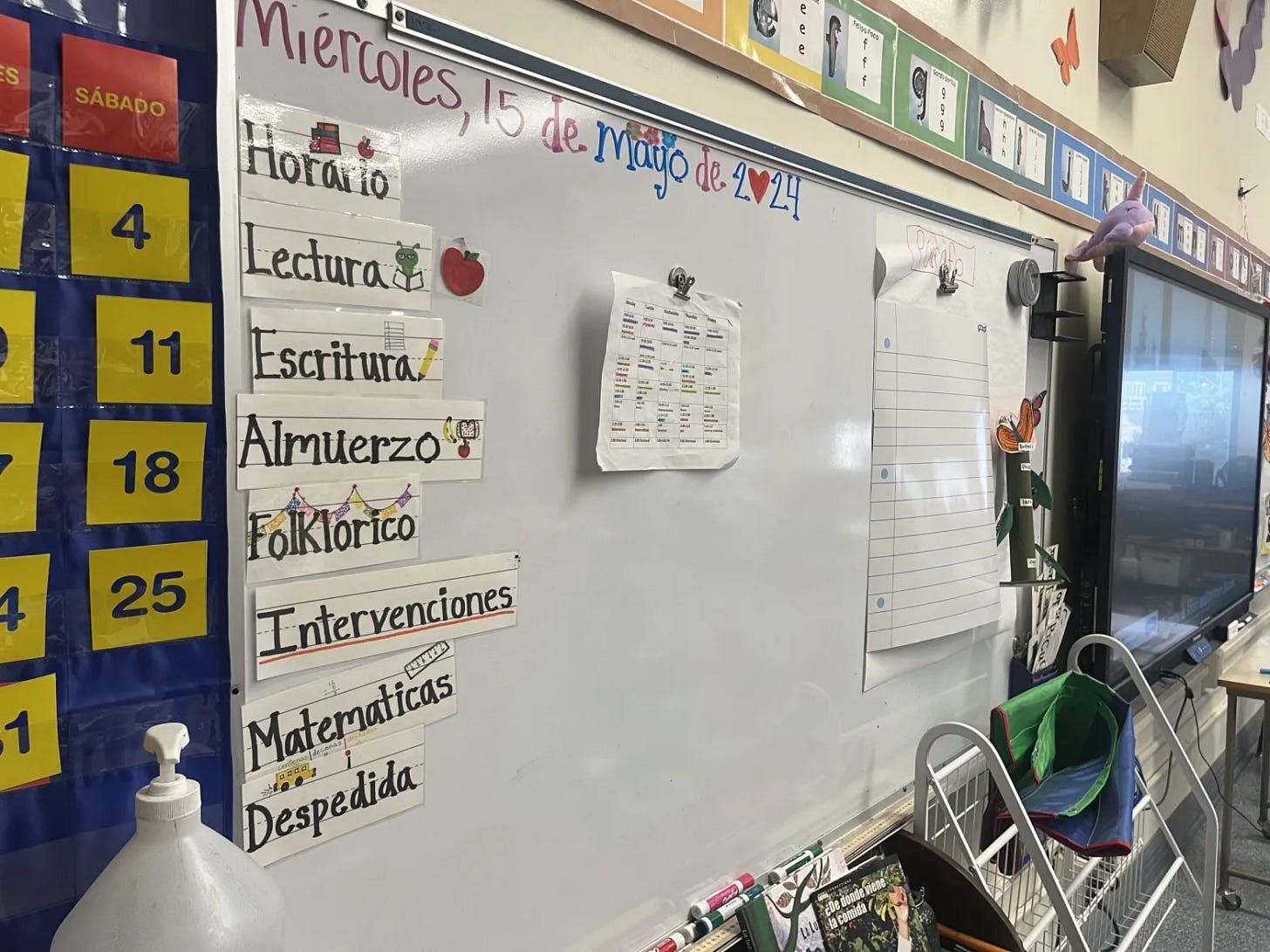💻💰 Mexican Cartels Exploit CBP One App to Target Asylum Seekers for Kidnapping and Ransom
🚫🇲🇽 Sheinbaum Rejects Trump’s Deportation Plans, Emphasizes Mexico’s Readiness to Handle Returnees 🌱⚖️ California Farmers Face Clash with Trump’s Deportation Plans Amid Labor Shortages

📱📚 Arizona's English-Only Laws Undermine Education for Immigrant Students, Study Shows
Carolina Cuellar, Arizona Luminaria.- Arizona's "English-only" education policy, which segregates non-English-speaking students for hours daily, has been linked to the state’s persistently low graduation rates for English learners, particularly Latino and immigrant students. Despite overwhelming evidence that dual-language programs improve academic success and college readiness, Republican State Superintendent Tom Horne is pushing to reinstate stricter English immersion laws. Critics argue that these policies hinder students' progress by isolating them from other subjects and peers. Studies have demonstrated that bilingual programs are far more effective, with students outperforming their peers in subjects like math and reading. For many immigrant students like Ileana Salinas, the English-only model only delayed their academic journey, leaving them struggling to catch up and integrate. As Arizona continues to face pressure to reform its education system, Salinas and others advocate for a more inclusive, culturally competent approach to learning.
📖✝️ Texas Approves Bible-Infused Curriculum, Sparking Controversy Over Religious Bias
Jaden Edison, The Texas Tribune.- The Texas State Board of Education has approved a new elementary curriculum, Bluebonnet Learning, that heavily incorporates biblical teachings. Critics argue that the curriculum places undue emphasis on Christianity, potentially isolating non-Christian students and violating the separation of church and state. However, supporters claim the lessons provide valuable cultural literacy and a better understanding of U.S. history. While school districts can choose whether to adopt the curriculum, those that do will receive a $60 per student incentive. The approval has sparked a broader debate over the role of religion in public education, with some arguing that the curriculum undermines religious neutrality in schools.
💊🚨 Texas Bill Aims to Reclassify Abortion Drugs as Controlled Substances, Raising Concerns for Medical Use
Eleanor Klibanoff, The Texas Tribune.- A new Texas bill seeks to reclassify abortion drugs, including mifepristone and misoprostol, as controlled substances, following a similar law in Louisiana that doctors argue has caused complications in treating other medical conditions. While the bill aims to prevent minors from accessing these drugs online for abortion purposes, it has sparked concerns among medical professionals about its impact on gynecological care. Experts argue that these medications, which are often used in miscarriage management and to treat hemorrhages, are safe and necessary. The bill is expected to face pushback from the medical community, as seen in Louisiana, where healthcare providers have raised alarms over the restrictions affecting patient care and prescribing practices.
🌱⚖️ California Farmers Face Clash with Trump’s Deportation Plans Amid Labor Shortages
Jessica Garrison and Rebecca Plevin, The Texas Tribune.- California’s farmers, heavily reliant on undocumented workers, may soon face labor shortages due to President-elect Trump's promised mass deportations. Many of California’s 162,000 farmworkers are undocumented, and if deportation efforts target this vital workforce, crops could be left to rot, leading to skyrocketing grocery prices. While some farmers are hopeful the administration will support them through the H-2A guest worker program, others fear further exploitation under this system. Farmworkers, particularly those undocumented, also face uncertainty, worrying about job loss and the potential for exploitation as immigration policies shift. Although Trump will likely focus on deporting criminals, the fear of mass deportations looms over the agricultural sector. Many workers and industry leaders are advocating for reform to secure a reliable workforce that is crucial to sustaining California’s agricultural output. The future remains uncertain as the administration outlines its next steps.
🚫🇲🇽 Sheinbaum Rejects Trump’s Deportation Plans, Emphasizes Mexico’s Readiness to Handle Returnees
Patrick J. McDonnell, The Texas Tribune.- Mexican President Claudia Sheinbaum condemned President-elect Donald Trump’s mass deportation plans, asserting that immigrants should not be labeled as criminals. She emphasized that Mexico is prepared for the potential influx of deportees, although no specific details on handling the returnees were provided. Sheinbaum stated that Mexico’s consular network in the U.S. would play a key role in assisting those affected. The president also aimed to highlight the crucial contributions of Mexican immigrants to the U.S. economy, hoping to convince the incoming administration to reconsider its approach. Despite the concerns over potential economic disruption, Sheinbaum’s administration is optimistic about managing the situation. Meanwhile, non-Mexican migrants are rushing toward the U.S. border, driven by the urgency of Trump's planned crackdown. The problem remains uncertain as Trump’s administration prepares to take office.
💻💰 Mexican Cartels Exploit CBP One App to Target Asylum Seekers for Kidnapping and Ransom
Jason Buch, San Antonio Express-News.- Migrants seeking asylum in the U.S. through the CBP One app are increasingly being targeted by Mexican cartels, who track their appointments and kidnap them for ransom. Asylum seekers, including families fleeing violence and persecution from countries like Venezuela and Cuba, rely on the app for appointments to present their cases at U.S. ports of entry. However, criminals use the app to pinpoint their victims, often in crowded transportation hubs, and hold them for ransom. Pedro Arandia, a Venezuelan migrant, described how he and his nieces were kidnapped in Reynosa after purchasing bus tickets to Matamoros, where they were held for 18 days. The U.S. government’s focus on CBP One has made it easier for cartels to exploit the system, raising concerns about the safety of asylum seekers who are already in vulnerable positions.






